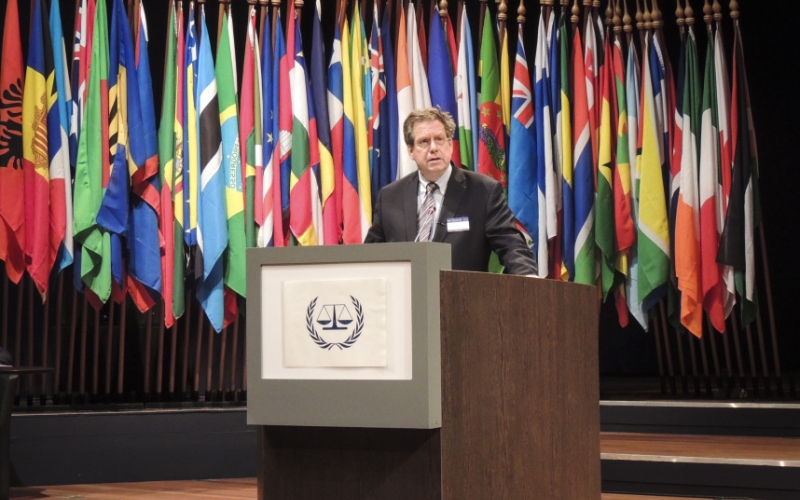Historic advances in democracy, justice, human rights, and the rule of law are under severe attack said William R. Pace, convenor of the Coalition for the ICC, in his address to the 14th Assembly of States Parties.
“Mr. President, civil society colleagues, excellencies and distinguished delegates,
Many have opened their general debate statements expressing sympathy to many states whose populations have suffered terrible terrorist attacks and crimes against humanity. Tragically, the situation is much worse and more extensive.
The historic advancements in the post-cold-war, post-apartheid period, in that brief decade of leadership best exemplified by world leaders like Nelson Mandela – these historic advances in democracy, justice, human rights, and the rule of law are under severe attack.
Indeed, we hoped during that decade that the 21st century would not repeat the 20thcentury which was the most war-ridden, destructive and violent in all of history. So far, 2001-2015 has been a continuation of the catastrophic failure of the maintenance of international peace and security by the international community.
The Rome Statute and the ICC has been hailed not only as one of the greatest advancements of international law in all history, but would be centerpieces of new structures for world peace.
But, Mr. President, ASP 14 appears to be demonstrating that many of the governments and their delegations of 2015 do not have the same political and legal commitment of those historic government leaders who 17 years ago voted 120 yes, 7 no to adopt the Rome Statute. The leaders of the delegations in Rome would be ashamed of the governments’ delegates here that are threatening, in some instances to undermine the ICC through financial strangulation, and in others threatening to violate fundamental principles of the Rome Statute through political interference with ongoing prosecutorial and judicial proceedings.
The core purposes of the global network of NGOs comprising the Coalition for the International Criminal Court are the pillars of the Rome Statute.
Bulleted they include: Independent Court, independent judges, independent prosecutor,propio motu, an ICC not controlled by the Security Council, automatic jurisdiction, jurisdiction for crimes in both international and non-international armed conflicts, unprecedented rights of victims, elaboration of sexual- and gender-based crimes , no reservations, no immunity – a Court widely thought ‘would never happen’. Few if any of these pillars could be agreed in a treaty negotiation in 2015.
Mr. President, the CICC is also very concerned about all aspects of the ‘selectivity’ of the application of international justice – including issues we raised with the Prosecutor this morning. But, we do not agree that the ‘selectivity’ is based on regional discrimination, racial discrimination or political discrimination and we fiercely oppose these.
The main cause of the ‘selectivity’ is the lack of jurisdiction because States have not ratified the treaty. Another main cause of selectivity is the 70 year old all-consuming power conflicts and hypocrisy in the UN Security Council, especially by and among the permanent members. And, in all honesty the rule by law still trumps the rule of law in a great many nations. To blame the ICC for these primary causes for ‘selectivity’ is an extreme contradiction of the facts.
Mr. President, in this regard the CICC has endorsed the ACT and France-Mexico codes of conduct confronting the misuse of the veto in blocking action to prevent or stop ICC crimes; and all of our members support consideration of deleting article 124.
The CICC electronic and printed statement and the extraordinary array of reports and documents on the tables outside this plenary, and on our website, reflect the breadth and depth of the CICC members’ commitment to all aspects of the Rome Statute and ICC, and to the issues before ASP 14.
Two last points. Delegates, electing the highest qualified and able to serve judges, improving the effectiveness and efficiency of the ICC, strengthening cooperation and complementarity, strengthening the cooperation between the ICC and the United Nations – all these can significantly reduce the unsustainable lengths of time international justice proceedings have taken during the last 20 years. These are the most important ways to reduce the costs of international justice and achieve deterrence – reducing the financial costs is very important, but reducing the horrendous human costs is much more important.
But, Mr. President, delegates, if in 5-10 years the ICC is recognized as a most professional, effective, efficient, non-selective and highest performing of international tribunals – would the criticism of the ICC be less than during the last six years? NO! – Indeed, the more effective the Court, the more criticism it is likely to invoke.
That is why the political, legal, moral, peace and justice leadership of this Assembly is so vital – to the ICC and to the sacred hopes for peace in this century.
Thank you”
Sign up today to receive daily ASP updates directly in your inbox.

